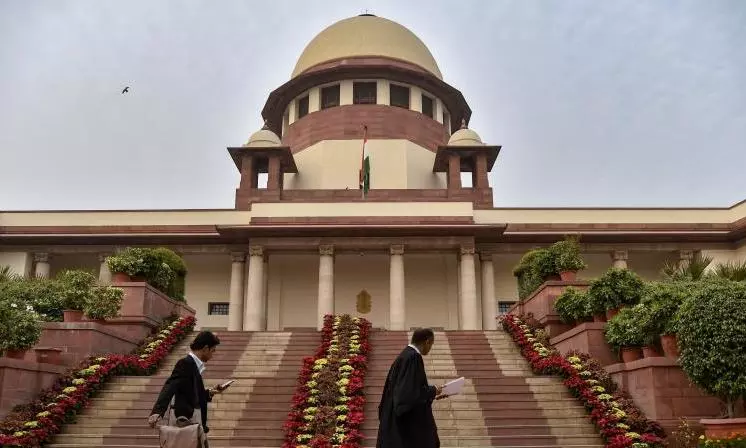Tycoons, Top Firms in List of Political Donors

New Delhi: A day before the Supreme Court’s deadline to make public all the data related to electoral bonds ends, the Election Commission uploaded on its website the files provided to it by the State Bank of India.
The BJP, Trinamul Congress and the Congress got the highest money. While most of the bonds have been issued in the name of political parties, the donations made to the Congress and the Samajwadi Party were made in the name of 'President, All India Congress Committee' and 'Adyaksha Samajvadi Party'.
The voluminous data gives out the details of electoral bonds purchased by companies and individuals, along with their identities and amounts, and the list of political parties that redeemed the bonds and the encashed amounts. However, it misses out on the much-sought-after data on which party redeemed the electoral bonds of which company or person, defeating the purpose behind the Supreme Court's order.
“In compliance with the Supreme Court's directions, contained in its orders dated February 15 and March 11, the SBI provided the data pertaining to the electoral bonds to the EC on March 12. The EC has today uploaded the data on electoral bonds on its website as received from the SBI on an as is, where is basis. The data received from SBI can be accessed at https://www.eci.gov.in/candidate-politicalparty,” the EC said.
The data, from April 12, 2019 till January 11, this year, has been uploaded in two parts. Part-1 has 337 pages with columns about the date of purchase, purchaser's name and denomination. Part-2 has 426 pages mentioning the date of encashment, name of the political party and denomination. There is no mention of the specially coded numbers on the bonds to link the bond to a purchaser; hence, it is not possible to know which party redeemed the bonds of which companies.
Some of the prominent buyers of the bonds were companies like Future Gaming and Hotel Services (`1, 350 crore), which was probed by the Enforcement Directorate in March 2022. This company bought EBs under two different sets of companies. Another major donor was Megha Engineering and Infrastructure (`966 crore) which was recently awarded large infrastructure projects.
Qwik Supply Chain Pvt Ltd (`410 crore), Vedanta Limited (`400 crore), Bharti Group (`246 crore), Essel Mining and Industries (`224 crore) are some of the biggest purchasers of the bonds. In fact, almost all corporates, working in all sectors have put their money in the bonds — from steel tycoon Lakshmi Mittal to billionaire Sunil Bharti Mittal's Airtel, Anil Agarwal's Vedanta, ITC, Mahindra and Mahindra. Vedanta Ltd bought Rs.398 crore worth of bonds. Steel magnate Lakshmi Niwas Mittal bought `35 crore worth of bonds in his individual capacity.
According to an earlier report by the Association of Democratic Reforms (ADR), electoral bonds worth Rs.16,518 crore have been sold from March 2018 to January 2024. The BJP received the highest contributions through the electoral bonds amounting to Rs.6,566 crore or 54.77 per cent, followed by the Congress with Rs.1,123 crore or 9.37 per cent, Trinamul Congress Rs.1,092 crore or 9.11 per cent, it had said.
In a post on X, senior lawyer and activist Prashant Bhushan wrote that the information about the electoral bonds uploaded by the EC, which they say is as received from the SBI, does not give the serial number of the bonds, which is necessary for finding who gave the bonds and to whom.
He argued that it was implicit in the top court's order and posted the Supreme Court's order, “…We are of the opinion that the information about funding to a political party is essential for a voter to exercise their freedom to vote in an effective manner. The electoral bond scheme and the impugned provisions, to the extent that they infringe upon the right to information of the voter by anonymising contributions through electoral bonds, are violative of Article (19)(1)(a)."
According to a news agency Reuters report, a company named “Prudent Electoral Trust” raised $272 million since its creation in 2013, funnelling roughly 75 per cent of the total money to the BJP.
“While Prudent does not disclose how donations made by individual corporate donors are distributed, Reuters used public records from 2018 to 2023 to track flows from some of India’s largest companies. Eight of India’s biggest business groups donated at least $50 million in total between 2019 and 2023 to the trust, which then issued cheques for corresponding amounts to the BJP,” according to the Reuters analysis.
In compliance with the Supreme Court’s order, the SBI submitted the data pertaining to electoral bonds to the EC on Tuesday.
The Supreme Court had on Monday ordered the SBI to disclose the details of electoral bonds to the Election Commission by the close of business hours on March 12. As per the order, the Election Commission had to publish the details shared by the bank on its official website by 5 pm on March 15.
On Monday, the SBI urged the Supreme Court to give it time till June 30 to collate the voluminous data. However, rejecting its request, the court ordered the bank to submit all details by Tuesday evening or else it will take contempt of court action against SBI chairman Dinesh Kumar Khara.
The SBI has issued electoral bonds worth Rs.16,518 crores in 30 tranches since the inception of the scheme in 2018. In an affidavit filed before the Supreme Court, the State Bank of India (SBI) said a total of 22,217 electoral bonds of varying denominations were purchased by donors between April 1, 2019 and February 15 this year, out of which 22,030 were redeemed by political parties.
On February 15, the Supreme Court scrapped this scheme that allowed anonymous political funding, calling it "unconstitutional" and ordered disclosure by the EC of donors, the amount donated by them and recipients.

